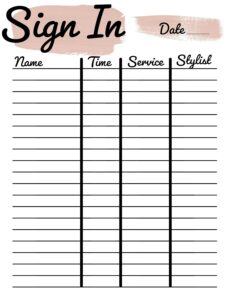As a beauty salon owner, you are responsible for protecting the privacy of your clients. A well-crafted privacy policy outlines how your salon collects, uses, and discloses customers’ personal information. It demonstrates your commitment to respecting their privacy rights and building trust. To help you get started, here’s a comprehensive beauty salon privacy policy template you can use and customize according to your specific business needs.
A privacy policy is a document that outlines how your salon collects, uses, and discloses your customers’ personal information. It demonstrates your commitment to respecting their privacy rights and building trust. Having a privacy policy in place is not only a legal requirement in many countries but also an ethical responsibility towards your clients. It assures them that their personal information is handled with care and respect.
Information Collection and Usage
Intro: This section should clearly state the types of personal information your salon collects from clients. Be specific about the purpose of collecting this information and how it will be used. Ensure compliance with relevant data protection regulations.
1. Client Contact Information: Name, email address, phone number, and physical address. This information is necessary for appointment scheduling, confirmation, and communication regarding services, promotions, and special offers.
2. Demographic Information: Age, gender, occupation, and lifestyle preferences. This information helps us better understand our clients’ needs and tailor our services accordingly.
3. Appointment Details: Date, time, services booked, and any specific requests or preferences. This information is essential for efficient scheduling and service delivery.
4. Payment Information: Credit card details, gift cards, or other payment methods used for transactions. We use secure payment gateways to protect sensitive financial data.
Disclosure of Information
Intro: Outline the circumstances under which your salon may share or disclose clients’ personal information. Emphasize that you will not sell or rent their information to third parties without their consent and will only share data when legally required or necessary for business operations.
1. Legal Compliance: We may be required to disclose personal information in response to lawful requests from government agencies, courts, or law enforcement officials.
2. Service Providers: We may share information with trusted third-party service providers who assist us in providing services, such as appointment scheduling software, online booking platforms, or marketing agencies. These providers are contractually obligated to protect your information.
3. Business Transactions: In the event of a merger, acquisition, or sale of assets, client information may be transferred to the new owners or operators. We will notify clients in advance and ensure a smooth transition.
4. Marketing and Promotions: With clients’ consent, we may use their contact information to send promotional materials, special offers, or updates about our services.
Conclusion
By implementing a comprehensive beauty salon privacy policy template, you demonstrate your commitment to protecting your clients’ personal information and respecting their privacy rights. This builds trust and confidence, enhances your reputation, and ensures compliance with relevant data protection regulations. Regularly review and update your policy to keep up with evolving laws and standards, ensuring that your salon’s privacy practices align with ethical and legal requirements.
Having a privacy policy in place not only protects your clients’ information but also safeguards your beauty salon’s reputation. By being transparent about how you handle personal data, you instill confidence in your clients and demonstrate your commitment to ethical business practices.
FAQ
1. Do I need a privacy policy for my beauty salon in my country?
Privacy laws and regulations vary by country. Check the specific requirements for your jurisdiction to determine if you are legally required to have a privacy policy for your beauty salon.
2. How often should I review and update my privacy policy?
It’s advisable to review your privacy policy regularly, especially when introducing new services, changing data collection practices, or in response to changes in data protection laws.
3. How can I make sure my beauty salon’s privacy policy is compliant with relevant laws and regulations?
Consult with legal experts or privacy professionals to ensure your policy aligns with the specific requirements of your jurisdiction and industry.
4. Is it okay to share customer information with third-party service providers?
Sharing customer information with third parties should only be done when necessary for business operations and with the consent of your clients. Ensure that you have contractual agreements in place with these service providers that require them to protect your clients’ data.
5. How can I handle requests from customers who want to access or delete their personal information?
Develop a clear process for handling such requests. Provide contact information in your privacy policy for customers to reach out and exercise their data rights.
